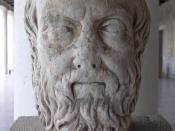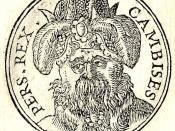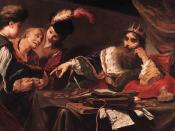It can be said that the majority of the first six books of Herodotus' The Histories can be divided into two distinct categories: cultural history where Herodotus discusses customs, beliefs, and daily lives of the people of Greece, Egypt, Persia, and other foreign lands; and political history where Herodotus speaks about the governments, kings, leaders, and military actions of the aforementioned lands. However, while these two opposing histories can be separated, they are far from separate, and it is this crossover of peoples and government which makes for some of the most interesting segments of Herodotus' inquiries. Being inquiries as he states in the opening line of Book I, though, one can wonder why it is he chooses to continually write about these two opposing groups, and what point he is trying to imply by doing so. It would seem more than likely that his opinion on government would at least somewhat affect his writings, and through what he includes and the way he chooses to include itOne such implication which Herodotus seems to make throughout his work is that rulers who are not just are punished in the end, regardless of the abilities or position.
One such example is Cambyses dying of a fatal wound in the same spot where he stabbed Apis, the sacred bull. Herodotus probably chose to include this so as to show Cambyses' own mortality and show that leaders are punished for their hubris. Herodotus seems to make a point of showing Cambyses as an unjust leader through his killing of Apis, dealings with the Egyptians, and his killing of his own servants for saving Croesus, so by telling of Cambyses' ironic death by his own sword, Herodotus makes a point of showing that rulers should not abuse their power. This is further reinforced when...


